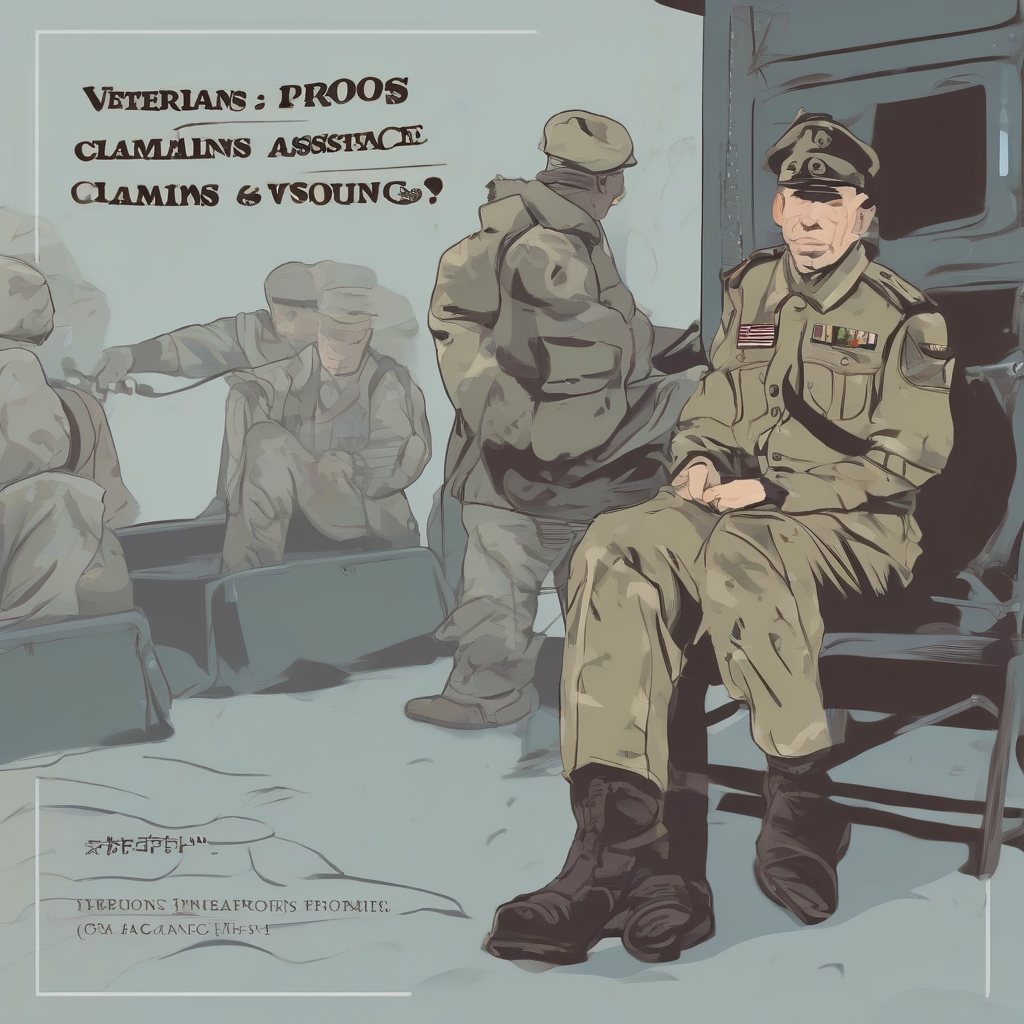
Navigating the Labyrinth: A Comprehensive Guide to Veterans Claims Assistance
The process of filing a veterans benefits claim can be daunting, filled with complex regulations, extensive paperwork, and often, frustrating delays. This guide aims to illuminate the path, providing veterans and their families with a clear understanding of the available resources and assistance programs designed to help navigate this challenging landscape.
Understanding the Veterans Benefits System
The Department of Veterans Affairs (VA) administers a wide range of benefits for veterans, including disability compensation, pension, healthcare, education, and home loans. Each benefit has its own specific eligibility criteria and application process. Understanding these nuances is crucial for a successful claim.
- Disability Compensation: This benefit is designed to compensate veterans for disabilities incurred or aggravated during their military service. The severity of the disability determines the compensation rate.
- Pension: This benefit provides financial assistance to veterans with limited income and resources who meet specific service requirements and disability criteria.
- Healthcare: The VA provides a comprehensive healthcare system for eligible veterans, including primary care, specialized care, and mental health services.
- Education: The GI Bill provides educational benefits to veterans, enabling them to pursue higher education or vocational training.
- Home Loans: The VA guarantees home loans, making it easier for veterans to purchase a home with favorable terms.
Types of Veterans Claims Assistance
Numerous avenues of assistance are available to veterans throughout the claims process. These resources can help veterans gather necessary documentation, complete applications accurately, and represent their interests before the VA.
- VA Regional Offices (ROs): Veterans can contact their local RO for guidance and assistance with their claims. RO staff can answer questions, provide application forms, and help gather necessary evidence.
- Veteran Service Organizations (VSOs): Numerous VSOs, such as the American Legion, Veterans of Foreign Wars (VFW), and Disabled American Veterans (DAV), offer free assistance to veterans filing claims. These organizations have accredited representatives who are knowledgeable about VA regulations and can assist with all aspects of the claims process.
- Accredited Agents and Attorneys: Veterans can also hire accredited agents or attorneys to represent them in their claims. While these professionals charge fees, they possess expertise in VA law and can effectively advocate on behalf of their clients.
- National Service Organizations (NSOs): Similar to VSOs, NSOs provide assistance in navigating the claims process, but might focus on specific populations of veterans.
- VA Claim Consultants: Some private companies or individuals offer paid assistance. It’s crucial to verify their qualifications and reputation before engaging their services.
The Veterans Claims Process: A Step-by-Step Guide
The claims process generally involves several key steps:
- Gathering Evidence: This crucial step involves collecting medical records, military service records, and other documentation supporting the claim. Insufficient evidence can lead to claim denial.
- Completing the Application: The VA offers various forms depending on the type of benefit sought. Accurate and complete information is essential.
- Submitting the Application: The application and supporting evidence can be submitted online through the eBenefits portal, by mail, or in person at a VA regional office.
- Claim Processing: The VA reviews the application and evidence, potentially requesting additional information. This phase can take considerable time.
- Decision Notification: The VA will notify the veteran of the decision on their claim. If denied, the veteran can appeal the decision.
- Appeals Process: The appeals process allows veterans to challenge unfavorable decisions. There are various levels of appeal, each with its own procedures and deadlines.
Common Challenges in the Veterans Claims Process
Veterans often encounter several challenges during the claims process:
- Complex Regulations: VA regulations are intricate and can be difficult to understand without assistance.
- Extensive Paperwork: The claims process involves considerable paperwork, which can be overwhelming for veterans.
- Long Processing Times: Claims can take months or even years to process, leading to frustration and financial hardship.
- Claim Denials: Many claims are initially denied, often due to insufficient evidence or incomplete applications.
- Appeals Process Complexity: The appeals process can be complex and time-consuming, requiring legal expertise.
Tips for a Successful Veterans Claim
To increase the chances of a successful claim, veterans should:
- Seek Assistance Early: Contact a VSO or other qualified representative as early as possible in the process.
- Gather Thorough Evidence: Collect all relevant medical records, military service records, and other documentation supporting the claim.
- Complete the Application Accurately: Pay close attention to detail when completing the application form.
- Follow Up Regularly: Check on the status of the claim periodically and respond promptly to any requests for additional information.
- Understand the Appeals Process: Familiarize yourself with the appeals process in case of a denial.
Resources for Veterans Seeking Assistance
Several organizations and websites provide valuable resources for veterans seeking claims assistance:
- Department of Veterans Affairs (VA): The VA website provides comprehensive information about benefits, eligibility criteria, and the claims process. [Insert link to VA website]
- American Legion: [Insert link to American Legion website]
- Veterans of Foreign Wars (VFW): [Insert link to VFW website]
- Disabled American Veterans (DAV): [Insert link to DAV website]
- eBenefits Portal: The eBenefits portal provides online access to VA services and benefits. [Insert link to eBenefits portal]
Specific Considerations for Different Types of Claims
The claims process can vary depending on the type of benefit being sought. For example, disability claims require detailed medical evidence, while pension claims focus on financial need and service history. Seeking assistance tailored to the specific type of claim can significantly improve the chances of success.
- Disability Claims: Emphasis on medical evidence, linking disabilities to military service.
- Pension Claims: Focus on income, assets, and service history.
- Education Claims: Verification of eligibility under the GI Bill.
- Home Loan Claims: Proof of veteran status and creditworthiness.
Addressing Mental Health Claims
Mental health claims often present unique challenges due to the subjective nature of mental health conditions and the potential for delayed diagnosis. Veterans seeking assistance with mental health claims should prioritize obtaining comprehensive medical records and working with a representative experienced in handling these types of claims.
- Importance of detailed medical records: Thorough documentation from mental health professionals is crucial.
- Linking mental health conditions to military service: Establishing a clear connection between the condition and military service is vital.
- Understanding the different types of mental health conditions recognized by the VA: Familiarity with VA criteria for various conditions like PTSD, depression, and anxiety.
Navigating the Appeals Process: A Detailed Look
If a claim is denied, veterans have the right to appeal the decision. The appeals process is multi-layered, involving different levels of review and potentially requiring the assistance of an accredited representative. Understanding the specific steps involved in the appeals process is critical for a successful outcome.
- Understanding the different levels of appeal: The appeals process can involve multiple stages of review, each with specific requirements and timelines.
- Gathering additional evidence for appeal: Supplemental evidence may be needed to support the appeal.
- Timelines and deadlines for appeals: Meeting deadlines is crucial to prevent the appeal from being dismissed.
- Representation during the appeals process: Seeking assistance from an accredited representative can significantly improve the chances of a successful appeal.
The Importance of Accurate Record Keeping
Maintaining organized records throughout the entire claims process is essential. This includes copies of all applications, supporting documentation, correspondence with the VA, and any decisions or appeals made. Keeping these records readily accessible can save significant time and effort during the process.
Conclusion (Omitted as per instructions)




